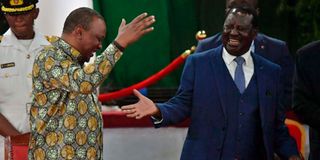Of BBI, Uhuru’s legacy and the lost things of life and literature

President Uhuru Kenyatta (left) with ODM leader Raila Odinga during the launch of the Building Bridges Initiative report in Nairobi on November 27, 2019.
“I have seen the moment of my greatness flicker, and I have seen the eternal Footman hold my coat, and snicker, and in short, I was afraid,” so wrote T.S. Eliot, in The Love Song of J. Alfred Prufrock and Other Poems.
All great men and women have defining moments — times when discord sharpens its blade and wrecks things in the cacophonous whir and rattle of the vertigo of success. St. John of the Cross, a 16th century Roman Catholic priest described his defining moment as the “dark night of the soul”.
For Adolf Hitler, the moment of reckoning was what he famously called Nacht der langen Messer — “the night of the long knives” — when he ruthlessly purged his Nazi party of those he considered traitors in a terrifying Feuertaufe (baptism of fire) for für Führer, Volk und Vaterland — for leader, people and Fatherland.
For President Uhuru Kenyatta and his handshake counterpart, former Prime Minister Raila Odinga, their baptism of fire was on Friday, August 20, 2021, when the appellate court rejected the Building Bridges Initiative (BBI). And the court rejected BBI in no uncertain terms — in excoriating rebuke.
Soaring in articulation, Justice Patrick Kiage delivered a rippling performance in a swift and devastating judgement — in language that almost made one want to bow before its splendour, its arcane syntax, to say nothing of its searing jargon, which he didn’t use sparingly or stiffly, but with the studied nonchalance of someone driving a dagger into another’s heart — to the swoony approbation of BBI opponents.
Most great people have solid achievements. But the fear of failure, however they deal with it, is never far behind. BBI is probably one chapter the president would have wished to knock off the way an accountant writes off bad debts. The president must be thinking of his legacy as he nears the end of his term and especially after the BBI ruling. The fear of failure or a “bad legacy” reminds one of the character Okonkwo in Chinua Achebe’s Things Fall Apart.
Heavy hand
All his life, Okonkwo was pushed by the fear of failure; the fear of becoming like his father (Unoka). Achebe captures it aptly, “Okonkwo ruled his household with a heavy hand... Perhaps down in his heart Okonkwo was not a cruel man.
But his whole life was dominated by fear, the fear of failure and of weakness. It was deeper and more intimate than the fear of evil and capricious gods and of magic, the fear of the forest, and of the forces of nature, malevolent, red in tooth and claw. Okonkwo’s fear was greater than these. It was not external but lay deep within himself. It was the fear of himself, lest he should be found to resemble his father.”
The president is probably wondering how he will be remembered. And recent events have apparently not been encouraging. Following a string of losses in recent by-elections, seeming rebellion in his Mt Kenya turf and now the unfavourable BBI ruling, the president seems to be reeling after a whirlwind chain of these events.
As a way of groping in the dark, if he were a poet, the president would have come up with a poem on “what-may-have-been.” Most of us have lost some things just like the president has lost BBI for now — something he put considerable time into. And when we lose something, we most likely fantasize about alternative outcomes that would have been. Wole Soyinka must have had this in mind when he wrote the poem entitled, “Lost Poems”. Probably thinking of lost opportunities, failed promises or unfulfilled dreams, Soyinka emotionally writes that, “I think sometimes of poems I have lost/…They do get lost, and I recall them... A falling leaf trapped briefly by the passing sun/It flashes, a mere shard of memory/But filled with wistful accusations/Of abandonment. Too late”.
Memory conjures
Sometimes what is lost is a vanished past and memory conjures it up in a desperate attempt to capture days gone by. This is what writer Tony Mochama does in his collection of poems, What if I am a Literary Gangster. Trying to capture memory and thought in all their fleetingness, he writes in a poem entitled, “St Petersburg”, in honour of his Russian-born friend and mentor, Mikhail Iossel: “In the surreal city of your birth: Blinded by your brilliance and the stark St Petersburg light/There again, I found my heart, walking against Russian rain….Still I see in my dreams some nights… St. Petersburg…” One wonders what the president sees in his dreams some nights. He must be wandering in the land of contradictions, ambiguities, lost things and lost opportunities — lost time, lost court cases and other unnamable lost things.
He must be yearning for a perfect legacy but is living in a frightful parallel universe where things don’t always go his way. Fortunately, he still has some time to wrap up his legacy. We can long for perfect outcomes but the present is what the president and all of us have — and we all have to fight with the hand we have been dealt. And sometimes, that hand is far from ideal.





